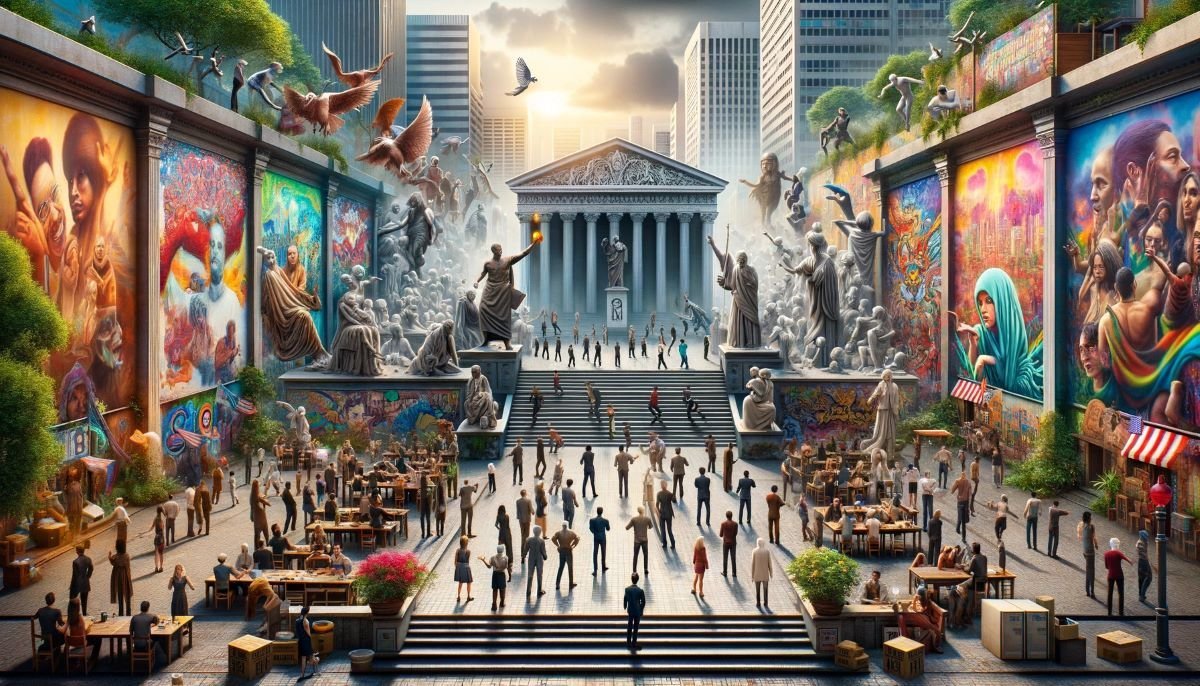Unraveling the Social Depths of Magical Realism
Magical Realism serves as a reflective mirror, allowing authors to address complex social issues in a nuanced way. By blending the real with the magical, these stories can subtly highlight societal injustices and absurdities. This unique approach enables readers to confront difficult themes in a context that is both engaging and thought-provoking.
Amplifying Marginalized Voices
The genre often elevates marginalized voices, offering a platform to those historically overlooked or silenced. Through its fantastical elements, Magical Realism can bring forth diverse perspectives and experiences, enriching the narrative tapestry with stories that might otherwise remain untold.
Political Commentary Through Fantasy
In Magical Realism, the fantastical elements often serve as tools for political critique. Authors can weave allegorical narratives that comment on political climates, power dynamics, and historical events. This indirect approach allows for a deeper exploration of political themes, resonating with readers in a powerful way.
Cultural Reflection and Critique
The genre is particularly effective in exploring cultural identity and heritage. Through Magical Realism, authors can delve into the intricacies of cultural traditions, examining how they shape individual and collective identities. This exploration often includes a critique of cultural norms, challenging readers to reconsider their own perceptions and biases.
Bridging the Past and Present
Magical Realism often serves as a bridge between historical events and contemporary issues. By interweaving myths and historical narratives into modern settings, these stories provide a unique perspective on how the past continues to influence present-day society.
In conclusion, Magical Realism is a potent medium for exploring social depths, offering a unique blend of reality and fantasy to address societal issues, amplify marginalized voices, and provide insightful political and cultural commentary. Its ability to connect the past with the present and to blend diverse narratives makes it a powerful tool in the landscape of contemporary literature.
The Power of Allegory and Symbolism
In Magical Realism, the use of symbolism is not just ornamental but functional. The magical elements in these stories often carry deeper meanings, symbolizing various aspects of real-world issues. This layered approach allows authors to explore and comment on complex social and political themes in a manner that is both subtle and profound.
Allegory: Reflecting Reality through Fantasy
Allegory is a powerful tool in Magical Realism, enabling writers to craft tales that, while fantastical on the surface, reflect real societal conditions and dilemmas. This technique offers a way to dissect and discuss sensitive topics indirectly, providing readers with a safe space to engage with and reflect upon these issues.
Social Critique through Magical Elements
The fantastical components in Magical Realism often serve as metaphors for societal issues. Whether it’s a magical occurrence that parallels a real-world event or a mythical creature embodying a social concept, these elements provide a unique lens through which readers can examine and understand complex themes.
Unpacking Layers of Meaning
The beauty of Magical Realism lies in its multiple layers of meaning. Readers are invited to unpack these layers, interpreting the allegories and symbols according to their perspectives. This interactive reading experience not only enhances engagement but also encourages deeper thinking about the underlying social and political messages.
The Universality of Symbolic Themes
Despite their specific cultural origins, the themes explored through symbolism and allegory in Magical Realism often resonate universally. This universal appeal highlights shared human experiences and emotions, making the genre relatable across different cultural contexts.
In conclusion, allegory and symbolism are integral to the power of Magical Realism as a genre for social critique. These literary devices enable authors to address significant societal and political themes in a way that is nuanced, impactful, and universally resonant. Through the magical elements in these narratives, readers are invited to explore and interpret complex issues, deepening their understanding and appreciation of the world around them.
Reflecting Societal Issues Through the Magical
In Magical Realism, the blend of everyday reality with fantastical elements creates a unique mirror that reflects societal issues. This genre skillfully uses the extraordinary to highlight and critique aspects of society like inequality, corruption, and cultural conflicts. The magical elements often serve to exaggerate or illuminate these issues, making them more visible and palpable to the reader.
Heightened Reality for Deeper Engagement
The introduction of magical components in these narratives creates a heightened sense of reality. This not only captivates the reader’s imagination but also encourages a deeper engagement with the underlying social themes. By transcending the limits of pure realism, Magical Realism can address complex issues in a more nuanced and impactful manner, often leaving a lasting impression on its audience.
A Thought-Provoking Approach to Real-World Issues
Magical Realism’s approach to societal issues is characterized by its ability to provoke thought and encourage reflection. The interplay of the real and the magical compels readers to view real-world problems through a different lens. This reimagining of reality allows for a fresh examination of familiar issues, often leading to new insights and understandings.
In conclusion, Magical Realism’s unique fusion of the real and the fantastical makes it an effective genre for exploring and commenting on societal issues. By presenting a heightened reality, it engages readers in a deeper, more reflective exploration of pressing social themes, offering new perspectives and insights into the complexities of the world we live in.
Notable Works and Their Impact
Gabriel García Márquez’s “One Hundred Years of Solitude” stands as a monumental work in the Magical Realism genre. This novel masterfully intertwines the fantastical with the historical, offering a poignant commentary on Latin American social and political issues. Márquez’s narrative, rich in allegory and symbolism, captures the struggles of generations within the Buendía family, mirroring the tumultuous history of the continent. Its impact on literature and its profound influence on public discourse are testaments to the power of Magical Realism in conveying complex themes.
Isabel Allende’s Cultural and Political Narrative
Isabel Allende’s “The House of the Spirits” is another cornerstone of Magical Realism, known for its vivid portrayal of Chilean life against a backdrop of political unrest. Allende weaves a family saga that spans generations, rich in mystical elements and deeply rooted in the political landscape of Chile. This novel not only tells a captivating story but also serves as a powerful commentary on issues like feminism, dictatorship, and social change, resonating with readers worldwide and contributing significantly to the genre’s impact on societal perceptions.
The Global Influence of Magical Realism
The works of Márquez, Allende, and other Magical Realist authors have had a profound impact on readers and society at large. These narratives have transcended their cultural origins to influence global literature and public discourse. Their ability to address universal themes through the lens of specific cultural and historical contexts has made them pivotal in shaping understanding and perceptions across diverse audiences.
In conclusion, notable works in the Magical Realism genre, such as “One Hundred Years of Solitude” and “The House of the Spirits”, have played a significant role in conveying social and political messages. These stories have not only entertained readers but have also influenced public discourse and perception, showcasing the genre’s capacity to address complex issues in a deeply resonant manner.
Contemporary Relevance
In the realm of contemporary literature, Magical Realism has adeptly adapted to the evolving landscape of global concerns. Today’s authors utilize this genre to address pressing contemporary issues, demonstrating its enduring relevance and flexibility.
Globalization and Its Impacts
The phenomenon of globalization, with its far-reaching cultural, economic, and social implications, has become a focal point in modern Magical Realism. Authors explore how global interconnectedness transforms individual and collective identities, often using magical elements to represent the complexities and contradictions of this process.
Navigating Identity Politics
Identity politics, another critical theme in today’s world, finds a unique expression in Magical Realism. The genre’s blend of reality and fantasy provides a potent tool for examining issues of race, gender, ethnicity, and sexuality, offering insightful perspectives on the politics of identity in contemporary society.
In conclusion, Magical Realism’s ongoing evolution in contemporary literature highlights its ability to remain pertinent and engaging. By adapting to include themes of globalization, identity politics, and environmental concerns, the genre continues to offer a rich, imaginative space for exploring and commenting on the pressing issues of our time.
The Transformative Power of Magical Realism in Social Discourse
Magical Realism holds a unique and powerful position in the realm of literary social discourse. Its distinct ability to interlace the extraordinary with the everyday provides a compelling framework for social and political commentary. Through its imaginative storytelling, Magical Realism offers a lens that magnifies societal constructs, inviting readers to view the world from a different perspective.
The genre’s transformative power lies in its capacity to transcend the ordinary, using elements of the fantastical to challenge conventional perceptions and provoke thought. This approach allows authors to explore complex social and political themes in a way that is both accessible and deeply resonant. The magical elements often serve as metaphors or allegories, providing a subtle yet powerful critique of societal norms and injustices.
Moreover, Magical Realism’s role in social commentary is not limited to a specific culture or region; it has a global reach. The genre’s versatility and adaptability make it relevant across diverse cultural contexts, allowing it to address a wide range of social and political issues pertinent to different societies.
In conclusion, Magical Realism’s enduring voice in literary social discourse is marked by its unique storytelling approach, which combines the fantastical with the real. By opening new avenues for understanding and critiquing societal constructs, Magical Realism continues to be a significant and impactful genre, offering insightful reflections on the world we live in and the forces that shape our experiences.





0 Comments